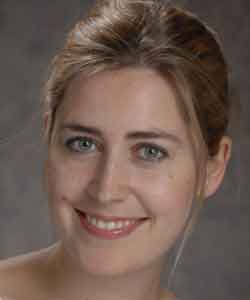Darby Saxbe
 University of Southern California
University of Southern California
http://dornsife.usc.edu/nestlab
What does your research focus on?
I am fascinated by how social interconnections, particularly within families, shape our bodies and brains. For example, are spouses’ cortisol levels coordinated? How do early family environments influence youths’ neural and physiological reactivity? Dreaming up lab acronyms may be the academic’s version of doodling your future spouse’s surname in your journal. I settled on NEST — for NeuroEndocrinology of Social Ties — because I work with a lot of nested data, but also because a nest is a nurturing place that families construct together, much as spouses, parents, and children weave a family context out of the moments of everyday life.
What drew you to this line of research and why is it exciting to you?
I have always been curious about what makes families tick. As a graduate student, I worked on the UCLA Center for the Everyday Lives of Families study, an observational study of middle-class families in their natural habitats, aka their homes. For example, I looked at how spouses’ housework time was linked with their cortisol levels at the end of the day. At the time, my interest in this topic was mostly academic, but then I got married and had two kids of my own and now I’m all too well acquainted with the challenges of maintaining a household.
Who were/are your mentors or scientific influences?
I have been really lucky on this front: I have had wonderful mentors in my corner. In particular, my graduate mentor Rena Repetti and my postdoctoral mentor Gayla Margolin have influenced not just the way I think about research, but also the way I hope to run my lab and my career. Both women have balanced work and family life while managing to be productive, influential scholars. Other inspiring mentors include Shelley Taylor, Tom Bradbury, Andy Christensen, and Ted Robles at UCLA. More recently, Mary Helen Immordino-Yang and Jonas Kaplan, at the University of Southern California, helped me dive into functional MRI (fMRI ) research without too many mishaps. More broadly, I’ve been wowed by the work of Megan Gunnar, Emma Adam, Janice Kiecolt-Glaser, Bruce Ellis, Martie Haselton, Naomi Eisenberger, and Ruth Feldman, among many others.
What’s your future research agenda?
I’m currently working with data from an fMRI study in which adolescents respond to video clips of themselves and their parents. I’m looking at how individual differences, like a history of family aggression, are linked with patterns of activation in the “mentalizing network” and other areas linked with social processing. Next, I’m hoping to pilot a transition-to-parenthood study in which I follow couples from pregnancy into the postpartum period. This seems like fertile ground (ha, ha) to look at dyadic, and then triadic, coordination of hormone levels, as well as the neural workings of the “parenting brain.”
What publication are you most proud of?
Saxbe, D. & Repetti, R. L. (2010). For better or worse? Coregulation of couples’ cortisol levels and mood states. Journal of Personality and Social Psychology, 98, 92–103.
This was originally a dissertation project, and we found that married couples showed correlations in their cortisol and negative mood levels over several days, even after controlling for sampling time. More dissatisfied couples showed stronger coordination. This paper was a challenge: I had to learn how to use dyadic multilevel modeling, for one thing, and it went through three rounds of detailed revisions before it got accepted to the Journal of Personality and Social Psychology . But it was exciting because it felt like we were answering a “no duh” question — whether spouses show similar cortisol levels — that no one had exactly answered before. Plus, the results have led me into new projects.





Comments
Dear Darby,
I think you are the Darby that went to Yale and knew my father George Musgrove.
I was wondering if I could send you a letter which I was hoping you might share with others at KTA.
I must say my father would be very proud of you and impressed with your research and knowledge.
Sincerely,
Althea
APS regularly opens certain online articles for discussion on our website. Effective February 2021, you must be a logged-in APS member to post comments. By posting a comment, you agree to our Community Guidelines and the display of your profile information, including your name and affiliation. Any opinions, findings, conclusions, or recommendations present in article comments are those of the writers and do not necessarily reflect the views of APS or the article’s author. For more information, please see our Community Guidelines.
Please login with your APS account to comment.